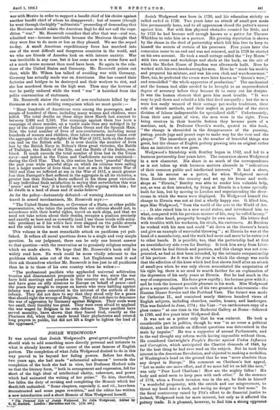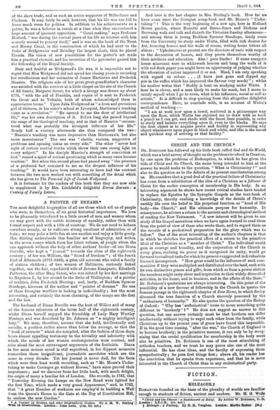JOSIAH WEDGWOOD.* IT was natural that Josiah Wedgwood'a great-great-granddaughter should
wish to add something more directly personal and intimate to what is already known of the career of the most famous of English potters. The completion of what Julia Wedgwood desired to do in this way proved to be beyond her failing powers. Before her death, two years ago, she had made "substantial advances" towards the completion of the book she had in view, but Professor Herford tells us that the literary form, "both in arrangement and expression, fell far short of the high ideal of intellectual clarity, coherence, and power which had animated the writing of her prime." To him, therefore, has fallen the duty of revising and completing the Memoir which her death left unfinished. "Some chapters, especially ii. and vii., have been reconstructed and some pages rewritten," and the editor has written a new introduction and a short Memoir of Miss Wedgwood herselL
• The Personal Life of Josiah Wedgwood. By Julia Wedgwood. Edited by V.11. Rexford. Leaden: Macmillan and Co. Ms. net.]
Josiah Wedgwood was born in 1730, and his education strictly so called ended in 1739. Two years later an attack of small-pox made hint permanently lame, and to all appearanoe closed the potter's career against him. But with him physical obstacles counted for little, and by 1753 he had become well enough known as a potter for Thomas Whitddon to take him as a partner. His growing reputation is shown by the clause in the deed of partnership which left him free to keep to himself the secrets of certain of his processes. Five years later the connexion came to an end and was not renewed, and in 1759 he started on his own account. He took a small cottage called the "Ivy House" with two ovens and workshops and sheds at the back, on the site of which the Market House of Burslem was afterwards built. Here he worked with his own hands among his men. Here he "made his models and prepared his mixture, and was his own clerk and warehouseman." Here, too, he perfected the cream ware later known as " Queen's ware," and remodelled " the whole apparatus of production." The mechanical and the human tool alike needed to be brought to an unprecedented degree of accuracy before they became fit to carry out his designs. It was the human element that gave him most trouble. "It was easy to pull down and rebuild a kiln that fired unequally ; but the men were less easily weaned of their cottage pot-works traditions, their rule of thumb methods, and their neglect in particular of the strict division of labour indispensable for specialized skill." Unfortunately, from their own point of view, the men were in the right. From being creators in their humble fashion they became parts of a machine, and, in Professor Church's words, quoted in this book, "the change is chronicled in the disappearance of the punning, jesting, puzzle jugs and posset cups to make way for the vase and the plaque." The immediate gain in the number of beautiful things was great, but the chance of English pottery growing into an original rather than an imitative art was gone.
Wedgwood's friendship with Bentley began in 1702, and led to a business partnership four years later. The connexion shows Wedgwood In a new character. His share in so much of the correspondence as is not taken up with business matters abounds in "indications of their common public and intellectual interests." It had a share, too, in his success as a potter, for when Wedgwood moved from Burslem into the country and set up his house and work- shops at "Etruria," Bentley was able to render him valuable help, not, as was at first intended, by living at Etruria in a house specially built for him, but by moving to London and superintending the show- rooms in which the wares were displayed. To Wedgwood himself the change to Etruria was not at first a wholly happy one. It lifted him, says Miss Wedgwood, "from the world of the arts to the World of Art. . . . It also raised him to a new social status, and introduced him to what, compared with his previous manner of life, may be called luxury." On the other hand, prosperity brought its own cares. His letters deal with troubles with his workmen, his rivals, his customers. At Burslem he worked with his men and could "sit down at the thrower's bench and give an example of successful throwing " ; at Etruria he was at the head of a manufactory, and the work had more and more to be entrusted to other hands. It is possible, too, that the partnership had at first an unsatisfactory side even for Bentley. It took him away from Liver- pool, where he had friends and position, and this change was not com- pensated, as had at first been intended, by the intimate companionship of his partner. As it was in the year in which the change was made that the affection of the knee which had first shown itself after an attack of small-pox when ho was only eleven necessitated the amputation of his right leg, there is no need to search further for an explanation of the depression of his early years at Etruria. But he had much in the way of compensation. His fame grew rapidly ; his fortune grew with it ; and he took the keenest possible pleasure in his work. Miss Wedgwood gives a separate chapter to each of his two greatest achievements—the
Russian Dinner Service and the Portland Vasa. The former was mails for Catherine IL, and contained nearly thirteen hundred views of English subjects, including churches, castles, houses, and landscapes. This was finished in June, 1774; the Vass—" an earthenware copy of a glass cameo" at one time in the Barberini Gallery at Rome—followed in 1790, and five years later Wedgwood died.
It was not as a potter only that he was. eminent. He took a considerable part in politics, though he was "in no sense a political thinker, and his attitude on different questions was determined in the main by impulse." He was a supporter of annual Parliaments, and in the end thought any reform worth having impossible without them.
He considered Cartwright's People's Barrier against Undue Influence and Corruption, which anticipated the Chartist demands of 1848, by far the best thing he had ever read on the subject. But he took little interest in the American Revolution, and objected to making a medallion of Washington's head on the ground that he was "more absolute than any despot in Europe." His comment on Chatham's last appeal, "Let us make one more effort, and if we must fall let us fall like men," was only "Poor Lord Chatham I How are the mighty fallen! His body and mind seem to keep pace with each other." In the summer of 1779, when a French invasion was in the air, he finds in himself "a wonderful propensity, with the ostrich and our misgovernors, to thrust my head into a bush, and seeing no danger to find none." In the fiscal controversy raised by Pitt's effort to do financial justice to Ireland, Wedgwood took far more interest, but only as it affected the pottery trade. It is pleasant, however, to find him e strong opponent
of the slave trade, and as such an active supporter of Wilberforce and Clarkson. It may fairly be said, however, that his life was too full to leave much room for politics. In addition to his achievements as a potter, he was a believer in canals at a timo when they encountered a large amount of ignorant opposition. "Canal-making," says Professor Herford, "was during the central years of his life an interest with him scarcely second to pottery itself," and it was on tho bank of the Trent and Mersey Canal, in the construction of which he had next to the Duke of Bridgewater and Brindley the largest share, that he placed Etruria. His vision of new possibilities for the potter's art made him a practical chemist, and his invention of the pyrometer gained him the fellowship of the Royal Society.
Busy and fruitful as Wedgwood's life was, it is impossible not to regret that Miss Wedgwood did not spend her closing years in recording her recollections and her estimates of James Martineau and Frederick Maurice. The religious side of her great-great-grandfather's character was satisfied with the services at a little chapel on the site of the Church of All Saints, Margaret Street, for which a liturgy was drawn up about 1776, "with the aid of Franklin, and copies of it sent to Frederick the Great and to Voltaire, both of whom acknowledged them in appreciative terms." Upon Julia Wedgwood as "a keen and precocious girl of thirteen, in his sister's school at Liverpool, Martineau's teaching came as a revelation." "He opened to me the door of intellectual life," was her own description of it. Before long she passed beyond the range of his theological teaching, and in that of Maurice " encoun- tered what was probably the strongest influence of her life." Nearly half a century afterwards she thus compared the two : " Mauriee's teaching was more impressive than Martineau's, but also more monotonous." The one was "elastic, various, suggestive of problems and opening vistas on every side." The other "never lost, sight of certain central truths which threw their own strong light on every subject." In his disciple Maurice's strength of conviction at first "roused a spirit of critical questioning which in many cases became reaction." But when this second phase had passed away "the presence of a profound fact remained to me as the deepest influence of his teaching." It would have been interesting to have had the contrast between the two men worked out with something of the detail which she has given to The Personal Life of Josiah Wedgwood.
It is fortunate for the readers of this book that they are now able; to supplement it by Mrs. Litchfield's delightful Emma Darwin : a Century of Family Letters.































 Previous page
Previous page